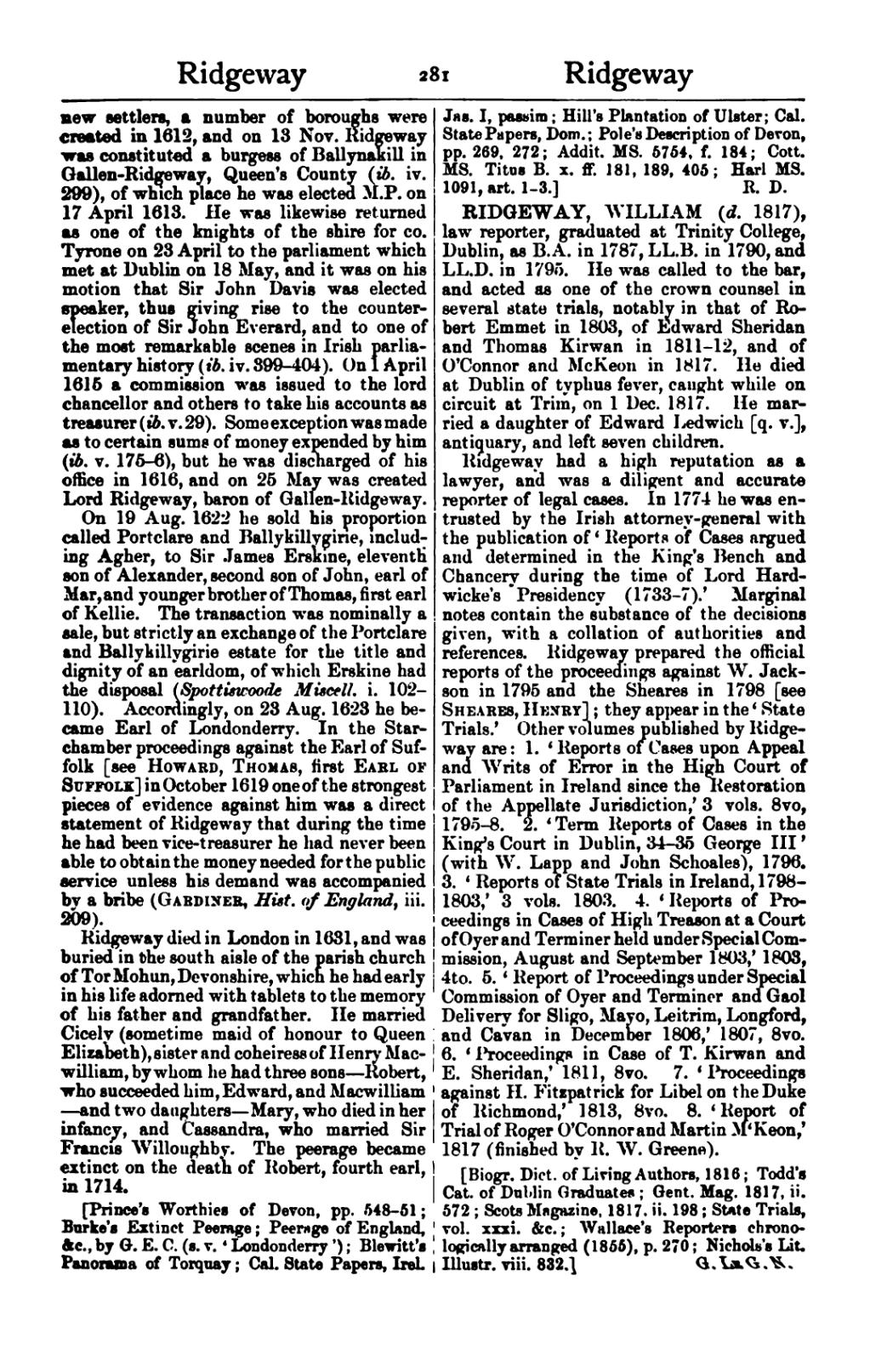new settlers, a number of boroughs were created in 1612, and on 13 Nov. Ridgeway was constituted a burgess of Ballynakill in Gallen-Ridgeway, Queen's County (ib. iv. 299), of which place he was elected M.P. on 17 April 1613. He was likewise returned as one of the knights of the shire for co. Tyrone on 23 April to the parliament which met at Dublin on 18 May, and it was on his motion that Sir John Davis was elected speaker, thus giving rise to the counter-election of Sir John Everard, and to one of the most remarkable scenes in Irish parliamentary history (ib. iv. 399–404). On 1 April 1615 a commission was issued to the lord chancellor and others to take his accounts as treasurer (ib. v. 29). Some exception was made as to certain sums of money expended by him (ib. v. 175–6), but he was discharged of his office in 1616, and on 25 May was created Lord Ridgeway, baron of Gallen-Ridgeway.
On 19 Aug. 1622 he sold his proportion called Portclare and Ballykillygirie, including Agher, to Sir James Erskine, eleventh son of Alexander, second son of John, earl of Mar, and younger brother of Thomas, first earl of Kellie. The transaction was nominally a sale, but strictly an exchange of the Portclare and Ballykillygirie estate for the title and dignity of an earldom, of which Erskine had the disposal (Spottiswoode Miscell. i. 102–110). Accordingly, on 23 Aug. 1623 he became Earl of Londonderry. In the Starchamber proceedings against the Earl of Suffolk [see Howard, Thomas, first Earl of Suffolk] in October 1619 one of the strongest pieces of evidence against him was a direct statement of Ridgeway that during the time he had been vice-treasurer he had never been able to obtain the money needed for the public service unless his demand was accompanied by a bribe (Gardiner, Hist. of England, iii. 209).
Ridgeway died in London in 1631, and was buried in the south aisle of the parish church of Tor Mohun, Devonshire, which he had early in his life adorned with tablets to the memory of his father and grandfather. He married Cicely (sometime maid of honour to Queen Elizabeth), sister and coheiress of Henry Macwilliam, by whom he had three sons—Robert, who succeeded him, Edward, and Macwilliam—and two daughters—Mary, who died in her infancy, and Cassandra, who married Sir Francis Willoughby. The peerage became extinct on the death of Robert, fourth earl, in 1714.
[Prince's Worthies of Devon, pp. 548–51; Burke's Extinct Peerage; Peerage of England, &c., by G. E. C. (s. v. ‘Londonderry’); Blewitt's Panorama of Torquay; Cal. State Papers, Irel. Jas. I, passim; Hill's Plantation of Ulster; Cal. State Papers, Dom.; Pole's Description of Devon, pp. 269, 272; Addit. MS. 5754, f. 184; Cott. MS. Titus B. x. ff. 181, 189, 405; Harl MS. 1091, art. 1–3.]
RIDGEWAY, WILLIAM (d. 1817), law reporter, graduated at Trinity College, Dublin, as B.A. in 1787, LL.B. in 1790, and LL.D. in 1795. He was called to the bar, and acted as one of the crown counsel in several state trials, notably in that of Robert Emmet in 1803, of Edward Sheridan and Thomas Kirwan in 1811–12, and of O'Connor and McKeon in 1817. He died at Dublin of typhus fever, caught while on circuit at Trim, on 1 Dec. 1817. He married a daughter of Edward Ledwich [q. v.], antiquary, and left seven children.
Ridgeway had a high reputation as a lawyer, and was a diligent and accurate reporter of legal cases. In 1774 he was entrusted by the Irish attorney-general with the publication of ‘Reports of Cases argued and determined in the King's Bench and Chancery during the time of Lord Hardwicke's Presidency (1733–7).’ Marginal notes contain the substance of the decisions given, with a collation of authorities and references. Ridgeway prepared the official reports of the proceedings against W. Jackson in 1795 and the Sheares in 1798 [see Sheares, Henry]; they appear in the ‘State Trials.’ Other volumes published by Ridgeway are: 1. ‘Reports of Cases upon Appeal and Writs of Error in the High Court of Parliament in Ireland since the Restoration of the Appellate Jurisdiction,’ 3 vols. 8vo, 1795–8. 2. ‘Term Reports of Cases in the King's Court in Dublin, 34–35 George III’ (with W. Lapp and John Schoales), 1796. 3. ‘Reports of State Trials in Ireland, 1798–1803,’ 3 vols. 1803. 4. ‘Reports of Proceedings in Cases of High Treason at a Court of Oyer and Terminer held under Special Commission, August and September 1803,’ 1803, 4to. 5. ‘Report of Proceedings under Special Commission of Oyer and Terminer and Gaol Delivery for Sligo, Mayo, Leitrim, Longford, and Cavan in December 1806,’ 1807, 8vo. 6. ‘Proceedings in Case of T. Kirwan and E. Sheridan,’ 1811, 8vo. 7. ‘Proceedings against H. Fitzpatrick for Libel on the Duke of Richmond,’ 1813, 8vo. 8. ‘Report of Trial of Roger O'Connor and Martin M'Keon,’ 1817 (finished by R. W. Greene).
[Biogr. Dict. of Living Authors, 1816; Todd's Cat. of Dublin Graduates; Gent. Mag. 1817, ii. 572; Scots Magazine, 1817, ii. 198; State Trials, vol. xxxi. &c.; Wallace's Reporters chronologically arranged (1855), p. 270; Nichols's Lit. Illustr. viii. 832.]
